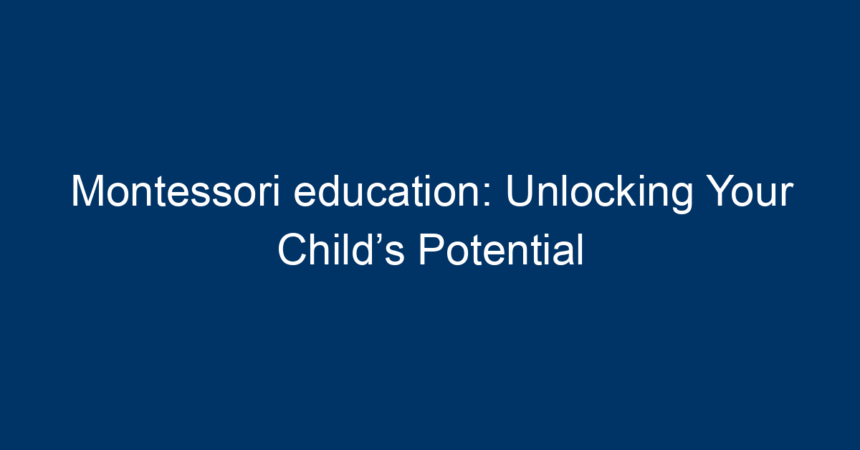In today’s fast-paced world, parents are increasingly searching for educational philosophies that can nurture their child’s individual potential. Enter Montessori education, a transformative approach that emphasizes independence, curiosity, and self-directed learning. Developed by Dr. Maria Montessori over a century ago, this method has gained traction globally, offering children the tools they need to thrive in a complex society. In this article, we will explore the fundamentals of Montessori education, its various benefits, and actionable insights for parents looking to incorporate its principles at home.
What is Montessori Education?
Montessori education is a child-centered learning philosophy founded on the belief that children learn best in an environment that encourages exploration and discovery. It emphasizes a hands-on approach, allowing children to engage with materials and concepts actively rather than passively absorbing information through lectures. Key elements of Montessori education include:
- Mixed Age Classrooms: Children of different ages learn together, promoting peer learning and cooperation.
- Prepared Environment: Classrooms are thoughtfully arranged to encourage exploration and are filled with age-appropriate, specialized learning materials.
- Teacher as Guide: Instead of traditional teachers, Montessori educators act as guides, observing each child’s interests and tailoring the learning experience to meet their needs.
The Core Principles of Montessori Education
To fully understand why Montessori education is effective, let’s delve deeper into its core principles.
1. Child-Centered Learning
Montessori education places the child at the center of the learning process. Each child’s interests, strengths, and pace are taken into account, paving the way for personalized learning experiences. This philosophy encourages children to take ownership of their education, leading to greater engagement and motivation.
2. Independence and Freedom within Limits
Independence is a crucial aspect of Montessori education. Children are given the freedom to choose their activities, fostering decision-making skills and self-discipline. This balance of freedom within set boundaries helps children learn responsibility while exploring their interests.
3. Hands-On Learning
Montessori classrooms are equipped with unique learning materials designed to facilitate tactile, sensory experiences. Children engage with these materials, allowing them to grasp abstract concepts through concrete experiences. This method enhances comprehension and retention of knowledge.
4. Collaborative Learning
The mixed-age classroom promotes collaboration over competition. Older children often help younger peers, reinforcing their own knowledge while developing empathy and social skills. This cooperative environment nurtures a sense of community and mutual respect.
Benefits of Montessori Education
The advantages of a Montessori approach are multifaceted, contributing to holistic child development.
1. Enhanced Cognitive Skills
Children in Montessori settings often exhibit higher levels of critical thinking and problem-solving skills. The freedom to explore concepts at their own pace encourages deep, meaningful learning. Research has shown that Montessori students tend to outperform their peers in standardized assessments.
2. Improved Emotional Intelligence
Montessori education nurtures emotional growth by teaching children to manage their feelings and develop resilience. As children engage in group activities, they learn to navigate social dynamics, which fosters empathy, self-regulation, and conflict resolution skills.
3. Lifelong Love of Learning
One of the most significant impacts of Montessori education is the cultivation of a lifelong passion for learning. By nurturing curiosity and an intrinsic desire to explore, children develop a mindset that values knowledge and personal growth.
4. Development of Practical Life Skills
Montessori classrooms emphasize practical life skills alongside academic learning. Children participate in everyday tasks such as cooking, gardening, and maintaining their environment, promoting self-sufficiency and responsibility.
Implementing Montessori Principles at Home
You don’t have to enroll your child in a Montessori school to benefit from its principles. Here are actionable insights for incorporating Montessori education into your home:
1. Create a Prepared Environment
Design a space that encourages independence and exploration. Organize materials on low shelves, making them easily accessible. Use natural materials, and keep the environment clutter-free and inviting. Designate specific areas for different activities such as reading, art, and practical life skills.
2. Encourage Independence
Allow your child to make choices about their learning. Create a daily schedule that gives them opportunities for independent activities. Celebrate their efforts, and provide gentle guidance rather than taking over tasks. Encourage them to dress themselves, prepare snacks, and clean up their spaces.
3. Foster Curiosity
Support your child’s interests by providing diverse learning materials. Visit libraries, nature centers, and museums together. Create a culture of exploration by asking open-ended questions that stimulate their curiosity.
4. Encourage Collaboration
Organize playdates or group activities that promote teamwork. Allow your child to engage in cooperative tasks such as cooking or gardening with siblings or friends, reinforcing social skills and teamwork.
Challenges and Misconceptions
While Montessori education boasts numerous benefits, it isn’t without its challenges and misconceptions.
1. Myth: Montessori Means No Structure
Many believe that Montessori education lacks structure. However, it is quite the opposite. While children have the freedom to choose their activities, they do so within a structured environment created by the educator. This balance is crucial for effective learning.
2. Myth: Montessori is Just for Young Children
While Montessori education is particularly effective for preschool and early elementary ages, its principles can be adapted for older students as well. Many Montessori schools offer programs for middle and high school students, focusing on collaborative projects, real-world applications, and self-directed learning.
3. Challenges of Implementation
Transitioning to a Montessori approach at home can be challenging for parents accustomed to traditional methods. It requires patience to allow children the space to explore and learn independently. Over time, however, you will likely see significant benefits.
Conclusion: Unlocking Your Child’s Potential
Montessori education is more than just a teaching method; it’s a philosophy that values the unique potential of every child. By fostering a love of learning, promoting independence, and encouraging collaboration, this approach equips children with skills they will carry throughout their lives. As parents, embracing Montessori principles at home can pave the way for your child’s academic success and emotional well-being.
Incorporate these practices into your daily routine, and watch as your child blossoms into a confident, capable individual. Montessori education might just be the key to unlocking your child’s full potential and fostering a lifelong love for learning.




